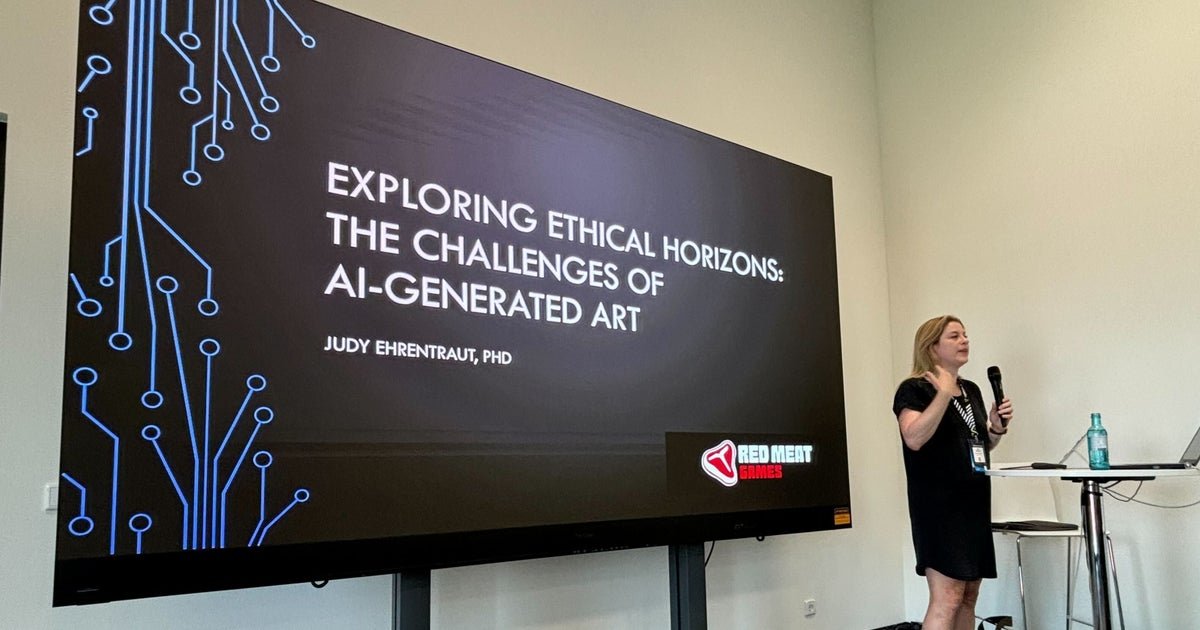Speaking at Devcom today, Judy Ehrentraut, Creative Content Strategist at Red Meat Games, discussed the importance of ethically training generative AI models and how certain tools can be used during game development.
“AI is the buzzword and it’s either presented as the new way to solve all productivity problems or it’s greeted with a groan,” Ehrentraut acknowledged.
“I think both of these approaches are very useful, because disruptive technologies are not necessarily good or bad. It depends on how they are used, and it really depends on the approach we take and whether it is ethical or not.”
But as Ehrentraut pointed out, AI can only learn what it is trained to do.
“AI is not intelligent in the way that we think it is or in the way that people claim it is. It’s just a tool that can learn from the instructions that we give it, whether it’s a big language model or algorithms that collect a bunch of data, scrape it from the internet and create what they call art, when in reality it’s just a mashup of the works of many artists – there’s no real human intent behind it.”
She noted that for this reason, AI generation tools give people some perception of the art they are creating.
“Many artists debate the effects of this disruptive technology, and many will say they enjoy the creative process,” Ehrentraut said.
“They appreciate the time it takes, that’s part of learning and production. They don’t appreciate that something can be produced in a second by a machine, because that takes away the intention behind it. It takes away the work, the practice, the collective intelligence that people have shared with others.”
She continued: “We know at this point that removing artists from the creative process is not the best idea. It’s not fair to use art once and then produce, produce, produce, until you’ve reached something that’s almost nothing – and that’s what we’re seeing now.
“The internet is becoming increasingly flooded with AI images at a very rapid pace, and AI is using the content it produces to train itself. It’s not training on human content, it’s training on its own content, and then it doesn’t realize it’s wrong and keeps going.”
There’s a lot of controversy surrounding generative AI right now, particularly with tools like Midjourney and Open AI’s Dall-E being accused of scraping art from the internet without the artist’s permission.
“AI is not intelligent in the sense that we think it is or in the sense that people claim it is.”
Red Meat Games has been very open about using gen AI when developing its latest game, Moriarty.
But instead of using something like Midjourney, he opted for Scenario — a tool that lets artists input their work and train an AI model instead of taking artwork from the internet without consent.
“Our artists have drawn all of these things, and we’re training Scenario to create more versions of our characters,” Ehrentraut explained.
“We don’t use Scenario to reproduce subjects, objects and style. We use it to generate new works in real time, because we are trying to give our game long-term replayability.
“We have a small team of artists, and that [sort of tool] This can be very useful for studios that have a small team and want a better return, because you’re really just extending what you’ve already created. You’re not creating something from scratch. And when I say nothing, I mean the AI you’re using was stolen from Google.
Ehrentraut said that by using Scenario, the team has more control over the process since the tool does specifically what it is asked to do.
“I think it’s more ethical because we’re not really training the AI from scratch: the system already has a basic understanding of concepts and objects. What it learns now is what you actually give it.”
For Red Meat Games, it’s about using next-gen AI as a tool to “encapsulate a more symbiotic relationship between human and AI system.”
“We need to give AI much more ethical responsibility and transparency,” Ehrentraut concluded. “We need to view AI as a [aspect] in a larger production, so it’s not the artist or the creator – it’s just a tool that artists and creators use, and together everyone creates this thing that we then call art.
#Exploring #Challenges #AIGenerated #Art #Game #Development
